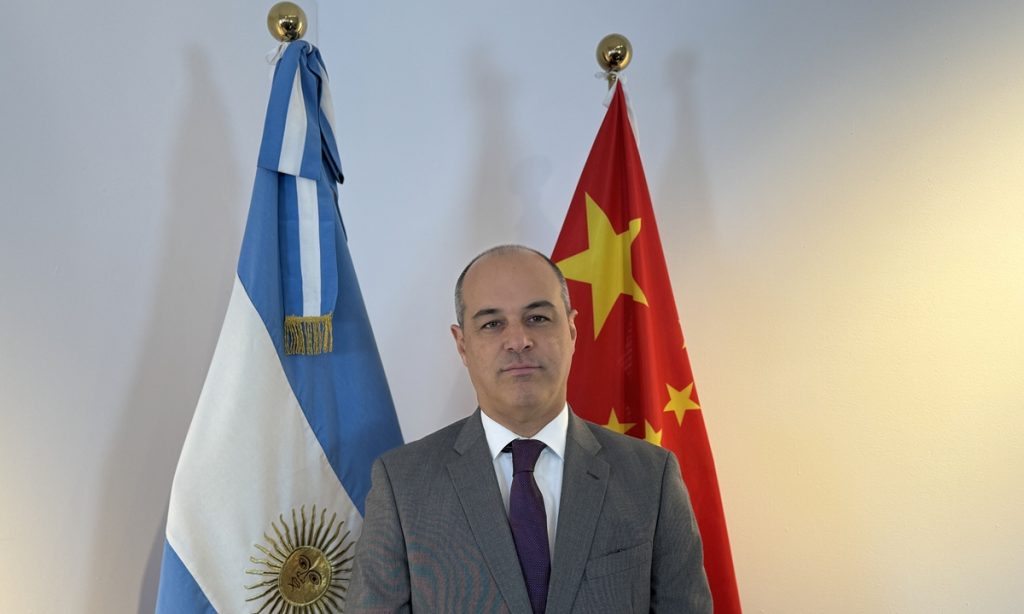Milei administration willing to continue deepening BRI cooperation with China: Ambassador of Argentina to China

"The idea that the Argentine government is trying to decouple from China is not correct; on the contrary... the relationship between Argentina and China has resulted in broad benefits for both parties," Marcelo Suarez Salvia, Ambassador of Argentina to China, told the Global Times in an exclusive interview. He noted the Argentine government's willingness to continue deepening cooperation with China under the framework of the Belt and Road Initiative (BRI) and welcomes more Chinese enterprises to invest in Argentina.
Earlier, Argentine President Javier Milei has announced his plan to visit China in January 2025, South China Morning Post reported. In a television interview earlier this month, Milei described China as a "very interesting commercial partner" and said he was "positively surprised by China," a stark contrast to his earlier hostile rhetoric, according to media reports.
Details of the visit are yet to be confirmed, the ambassador said, while noting that "what I can say in advance is that, being the first official high-level meeting since Milei's inauguration as President of Argentina last December, Milei will seek to engage in direct and frank conversations to learn firsthand about the measures and reforms that have led China down a path of undeniable economic development, with a significant poverty reduction impact and eradication of extreme poverty in China."
Salvia said that Milei's planned visit to China underscores that Argentina has no intention of decoupling from China. In the interview, the Argentine diplomat refuted claims that "the current Argentine government seeks to decouple from China" and that "China-Argentina relations are regressing."
The Ambassador said that the current development of China-Argentina relations is good and that there is still room for further enhancement. "We have a lot of confidence and faith that the relationship with China will improve; we do the daily work and put in the effort to make everything better."
Salvia told the Global Times that the Argentine President has stated that he views China as an interesting partner, a partner supportive in Argentina's times of need, Argentina shows reciprocity by avoiding participation in international sanctions on certain Chinese products in the international market. The Chinese government has shown support for this process, specifically through cooperation between central banks, whose currency swap agreement contributes to Argentina's macroeconomic stability, Salvia noted.
The Argentine diplomat said this year marks the tenth anniversary of the establishment of the comprehensive strategic partnership between China and Argentine, which has resulted in significant benefits for both parties.
One of the major pillars of the bilateral relationship is the economies of both countries are strongly complementary. This means not only that the relationship has a vast potential for further deepening trade and investment ties, but also that the Argentine productive sector is closely linked to China, said Salvia. The imports that Argentina purchases from China, including manufacturing and technological components, are an integral part of local and regional supply and value chains.
This fact is widely acknowledged across Argentina's political landscape, which is why "decoupling" is far from Argentina's political stance on China, nor the specific relationship between Argentina and China, the ambassador noted.
China remains Argentina's second-largest trading partner, behind Brazil. In addition, Chinese investments in infrastructure and logistics have been essential for Argentina over the past several decades, along with China's invaluable financial support through currency swap agreements, Xinhua News Agency reported last year.
In February 2022, Argentina strengthened its bilateral ties with China by joining the Belt and Road Initiative (BRI). In June 2023, the two nations advanced their partnership through a signed cooperation plan to jointly promote the construction of the Belt and Road.
However, following Argentina's change in government, public concerns have arisen about whether the cooperation between China and Argentina under the BRI framework will proceed smoothly, and whether China's investments and participation in construction projects in Argentina can be guaranteed in terms of safety and legal interests.
The current Argentine government will continue to seek to deepen cooperation with China under the BRI framework, said Salvia.
He noted that Argentina recognizes the relevance of the BRI, especially in its role in addressing infrastructure gaps in emerging and developing economies. He stated that the port, railway, and highway networks are crucial for a country, a region, and even global integration. Enhanced infrastructure networks can facilitate a broader and more efficient flow of goods and services across continents, enhance trade and investment levels, and yield mutual benefits on a global scale.
In April this year, Minister of Foreign Affairs, International Trade and Worship of Argentina Diana Mondino visited China. Salvia shared that during her meetings with Chinese officials, Argentina reaffirmed its commitment to continue advancing cooperation with China on strategic projects beneficial to both countries. In addition, Argentina aims to continue establishing itself as a reliable supplier of high-quality agricultural products to China, and complete negotiations for the export of beef, seafood, dried fruits, and other agricultural products to China.
"Argentina also is well-positioned in the near term as a key energy exporter, and we are confident in our ability to expand partnerships with Chinese energy companies to maximize cooperation," said the ambassador.
The Argentine diplomat noted that Chinese investments are welcomed in Argentina not only in the mining sector but also in energy, forestry, infrastructure, tourism, and many other areas included in the recently launched Incentive Regime for Large Investments (RIGI) by the government. This incentive offers significant benefits in terms of tariffs, taxes, exchange rates, and regulations, which will undoubtedly encourage even more companies to invest in Argentina.